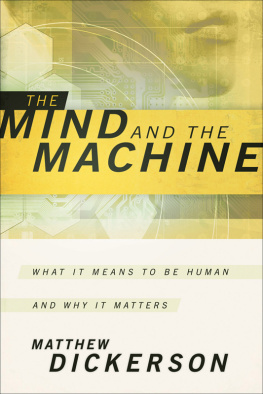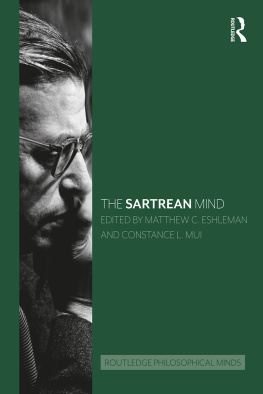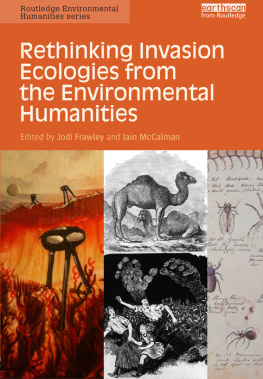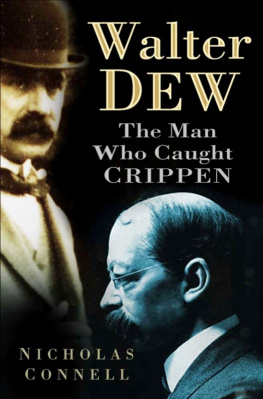Matthew Crippen - Mind Ecologies
Here you can read online Matthew Crippen - Mind Ecologies full text of the book (entire story) in english for free. Download pdf and epub, get meaning, cover and reviews about this ebook. publisher: Columbia University Press, genre: Romance novel. Description of the work, (preface) as well as reviews are available. Best literature library LitArk.com created for fans of good reading and offers a wide selection of genres:
Romance novel
Science fiction
Adventure
Detective
Science
History
Home and family
Prose
Art
Politics
Computer
Non-fiction
Religion
Business
Children
Humor
Choose a favorite category and find really read worthwhile books. Enjoy immersion in the world of imagination, feel the emotions of the characters or learn something new for yourself, make an fascinating discovery.

- Book:Mind Ecologies
- Author:
- Publisher:Columbia University Press
- Genre:
- Rating:5 / 5
- Favourites:Add to favourites
- Your mark:
- 100
- 1
- 2
- 3
- 4
- 5
Mind Ecologies: summary, description and annotation
We offer to read an annotation, description, summary or preface (depends on what the author of the book "Mind Ecologies" wrote himself). If you haven't found the necessary information about the book — write in the comments, we will try to find it.
Mind Ecologies — read online for free the complete book (whole text) full work
Below is the text of the book, divided by pages. System saving the place of the last page read, allows you to conveniently read the book "Mind Ecologies" online for free, without having to search again every time where you left off. Put a bookmark, and you can go to the page where you finished reading at any time.
Font size:
Interval:
Bookmark:
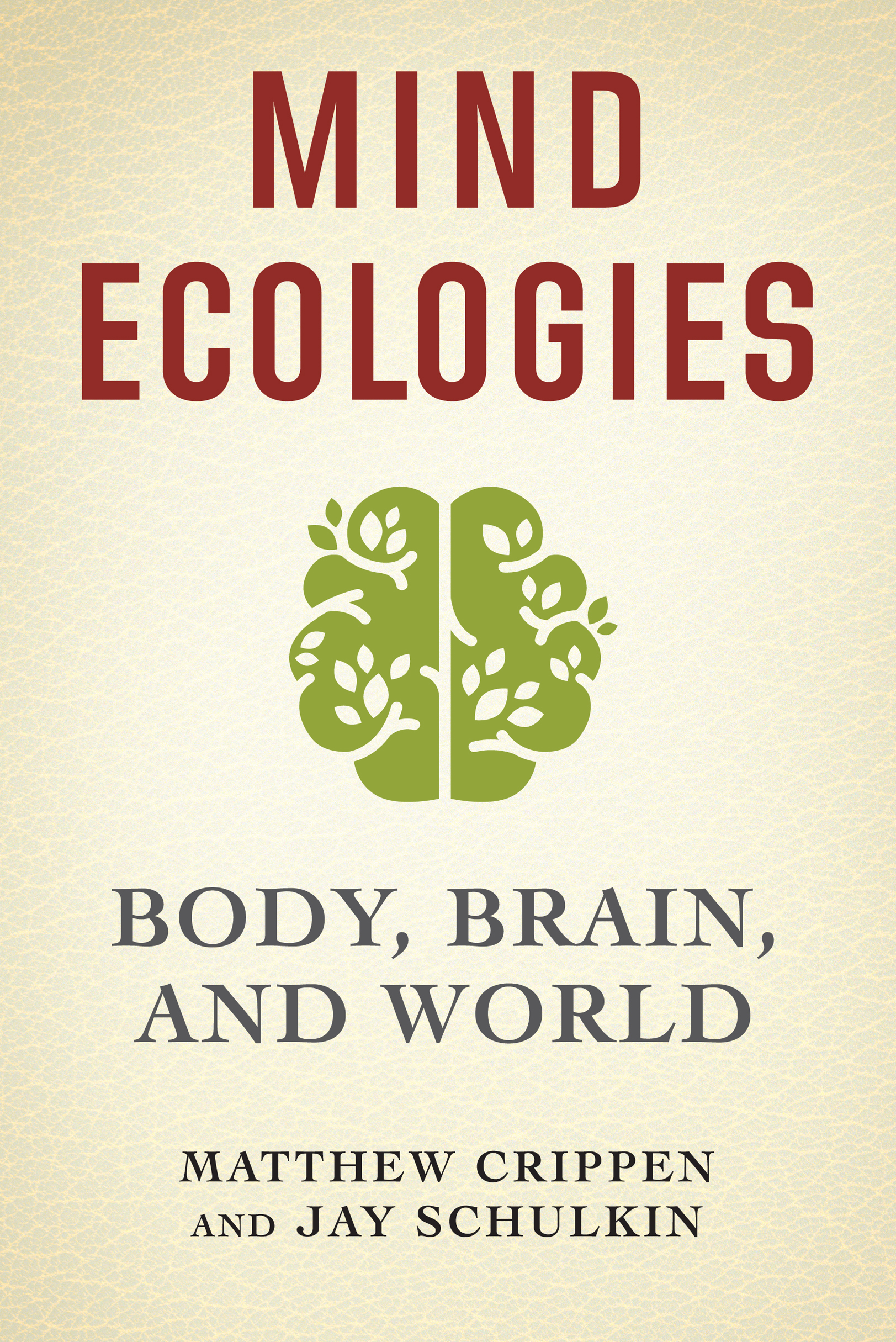
MIND ECOLOGIES
MIND ECOLOGIES
BODY, BRAIN, AND WORLD
MATTHEW CRIPPEN AND JAY SCHULKIN
Columbia University Press
New York

Columbia University Press
Publishers Since 1893
New York Chichester, West Sussex
cup.columbia.edu
Copyright 2020 Columbia University Press
All rights reserved
E-ISBN 978-0-231-54880-9
Library of Congress Cataloging-in-Publication Data
Names: Crippen, Matthew, author. | Schulkin, Jay, author.
Title: Mind ecologies : body, brain, and world / Matthew Crippen and Jay Schulkin.
Description: New York : Columbia University Press, 2020. | Includes bibliographical references and index.
Identifiers: LCCN 2020006020 (print) | LCCN 2020006021 (ebook) | ISBN 9780231190244 (cloth) | ISBN 9780231190251 (paperback)
Subjects: LCSH: Philosophy of mind.
Classification: LCC BD418.3 .C745 2020 (print) | LCC BD418.3 (ebook) | DDC 128/.2dc23
LC record available at https://lccn.loc.gov/2020006020
LC ebook record available at https://lccn.loc.gov/2020006021
A Columbia University Press E-book.
CUP would be pleased to hear about your reading experience with this e-book at .
Cover design: Julia Kushnirsky
Cover illustration: Adobe Stock
F or one of us, the origins of this book go back to the 1970s. For the other, the immediate impetus was more recent: a 2012 conference paper fusing pragmatism, phenomenology, and work on artificial intelligence (AI). This was combined with the suggestion from Lana Khle (then a doctoral candidate under the supervision of Evan Thompson) that embodied, embedded, enactive, and extended perspectivesotherwise known as 4E cognitive sciencebe added to the mix.
The last decade has brought us both into repeated contact with the 4E idea. Numerous conferences have also brought reoccurring intercourse with rising and established scholars weaving comparable threads, and who have in various ways shaped the trajectory of this book. Among those we wish to acknowledge are Tony Chemero, Ewa Chudaba, Joerg Fingerhut, Mark Johnson, Matthias Jung, Oliver Kauffmann, Roman Madzia, Richard Menary, Donata Schoeller, and Tibor Solymosi. Roman Madzia and Matthias Jung in fact organized a conference on pragmatism and cognitive science at the University of Koblenz-Landau, which most of the preceding scholars attended. Less than a half year later, another conference on the same topic took place at the American University in Cairo, with some of the above contingent presenting and contributing to a special issue of Contemporary Pragmatism. During this same period, Roberto Frega and Pierre Steiner organized still another conference on pragmatism and 4E cognitive science in Paris, where many of us met once more. In the spring of 2016, a few of our paths crossed yet again at a conference on pragmatism and the brain, organized to some extent around the work of John Shook and Tibor Solymosi, and held at the University of North Carolina at Ashville. This is where the two of us began talking in earnest.
The two of us found that we got along personally and stayed in contact. It helped that we thought alike on most matters pertaining to mind. Over the next months we increasingly discovered that our interests intersected and mutually complemented one anothers. By Christmas of 2016, we were toying with the idea of writing some papers together. A few months later, this evolved into plans for this book.
Any major academic endeavor owes debts to others. In addition to those already mentioned, we would like to acknowledge teachers and scholars whom we cite too little or not at all, but who have nonetheless had a lasting influence on our intellectual development and this book. These include Catarina Belo, Kent Berridge, Jeanette Bicknell, Evan Cameron, Matthieu de Wit, Chris Green, Henry Jackman, David Jopling, Scott Jordon, Alexander Kremer, David Moffat, Ian McGregor, Phillip McReynolds, Bob Neville, Diego Nigro, Hal Pashler, Bryony Pierce, Elaine Powney, Jeff Rosen, Paul Rozin, Stuart Shanker, Rebekah Smick, Mog Stapleton, Susan Stuart, and Bob Sweetman. Among others who have left an imprint on us are Patrick Heelan, Sam Mallin, Curt Richter, George Scanlon, Eliot Stellar, and George Wolf, all now passed on. We offer especial thanks to Rob Switzer for his friendship and encouragement, and for suggesting alternative approaches when funding for a preliminary project that was to lay the seeds for this book collapsed. We are grateful to John Shook for permission to use amended fragments of a 2017 article published in Contemporary Pragmatism. We likewise acknowledge the largely invisible work of those in support roles who make scholarship possible, including administrative and student assistants, along with individuals at Columbia University Press. Among these are Sherifa Amin, Cristal Del Biondo, Reem Deif, Christine DeMichieli, Salma El-Galley, Zack Friedman, Lowell Frye, Ahmed El-Kosheiry, Salma El-Nager, Hadeel El-Sayed, Marwa Adel Farid, Khadeega Gafar, Yossra Hamouda, Hagar Hod, Kat Jorge, Isa Kundra, Julia Kushnirsky, Aya Morsi, Monica Abed Ramsis, Sherif Salem, and Heba Youssry. We offer especially hearty gratitude to Audra Sim for her superb and very thoughtful copyediting.
Wendy Lochner at Columbia University Press dedicated herself to getting this book published, offering fruitful suggestions while exhibiting patience with several missed deadlines, and we offer thanks to her. Sarah Hammadan exceptional former student and research assistantdid superb work contributing to . Other institutions have lent forms of support, especially the American University in Cairo, Georgetown Universitys Department of Neuroscience, and Humboldt Universitys Berlin School of Mind and Brain. They are joined by O. P. Jindal Global University, Pusan University, and the University of Washington. For various kinds of additional support, we would also like to thank Arwa Al-Magariaf; Ramy Amin; Amy Carrillo; Sean Collard; Franca DeAngelis; Stuart Dennie; Diane, Peter, and Matthew Dixon; Steve Formaneck; Taha Gebril; Senica Gonzalez; John and Karine Hauser; Betty and Daniel LaBrash; Jeff Langman; Adham Mandour; Mariam Matar; Gord McClennan; Fred Nix; Ian Rennie; Aislinn Rose; Sandy Schulkin; Judy Straut; Susan Straut-Collard; and Gnther and Mathilde Struck. Our thanks extend to Pegge Crippen, Marion Hawkins, Rosalind Schulkin, and other family relations, especially Chick Straut, who was a fellow intellectual traveler until he passed away at the end of 2018.
Some of those mentioned have been particularly inspirational on an intellectual level. With this in mind, we dedicate this book to Evan Cameron, Tony Chemero, Mark Johnson, and Tibor Solymosi. We also dedicate it to our immediate families: Bob, Paula, Marc, Najma, and Shannan, and April, Danielle, and Nick.
A fter having fallen out of favor, pragmatism is resurging. This is especially so in cognitive science and value theory, two fields increasingly intertwined. Cognitive science, especially, is undergoing a pragmatic turn away from representational models, with proponents from competing quarters embracing embodied approaches that recognize the centrality of aesthetics, emotions, and interests to human experience. This development is clearly in the spirit of the classical pragmatists, not to mention phenomenologists, who are fellow travelers throughout this book. A number of neuroscientifically literate philosophers and philosophically literate neuroscientists are approaching comparable conclusions and, accordingly, embracing pragmatism; Antonio Damasio, among others, cites it as an anchor of his thought.
Font size:
Interval:
Bookmark:
Similar books «Mind Ecologies»
Look at similar books to Mind Ecologies. We have selected literature similar in name and meaning in the hope of providing readers with more options to find new, interesting, not yet read works.
Discussion, reviews of the book Mind Ecologies and just readers' own opinions. Leave your comments, write what you think about the work, its meaning or the main characters. Specify what exactly you liked and what you didn't like, and why you think so.


